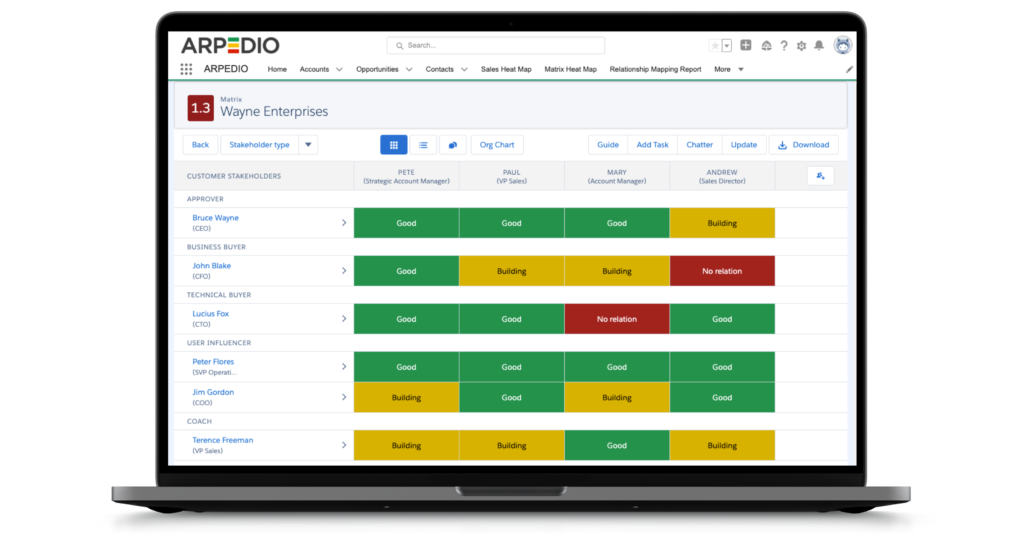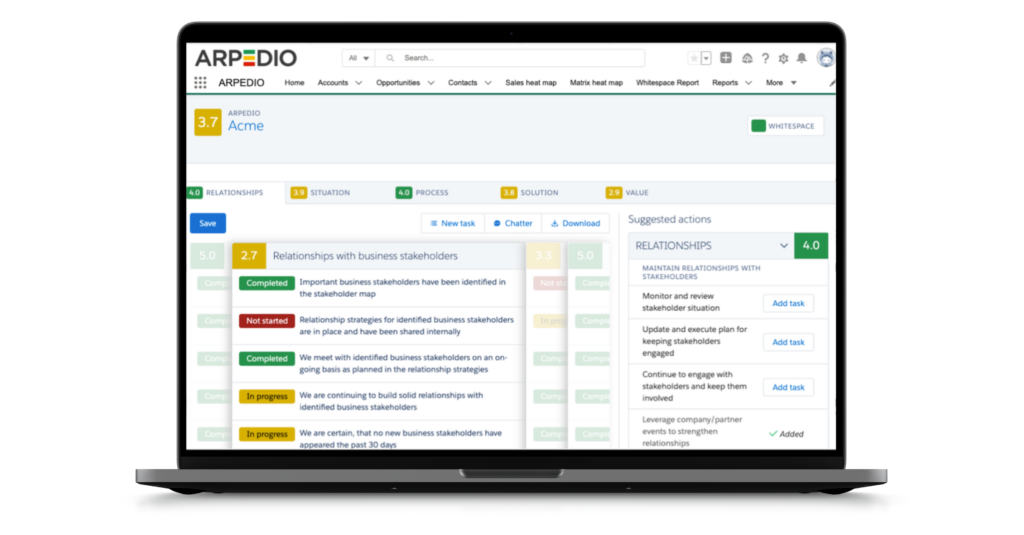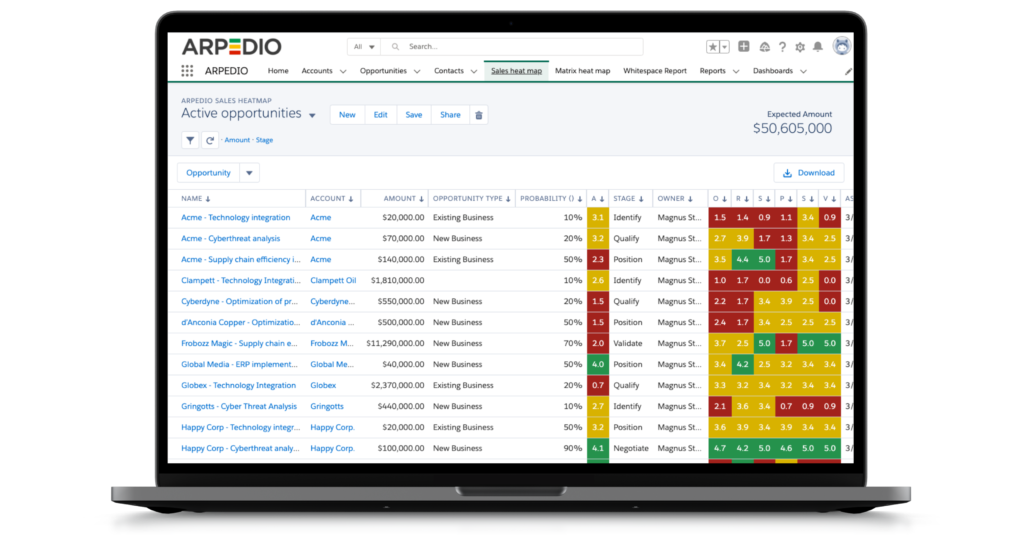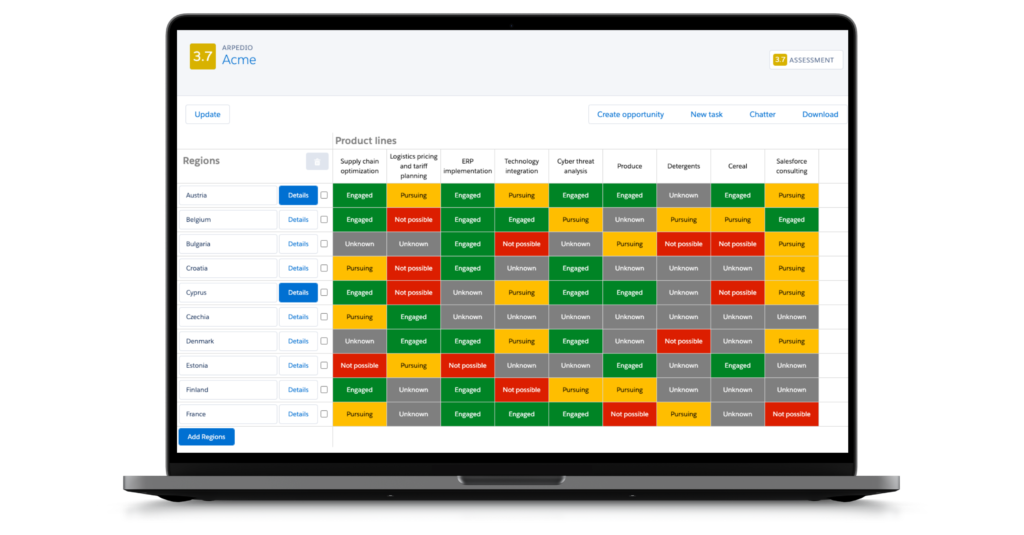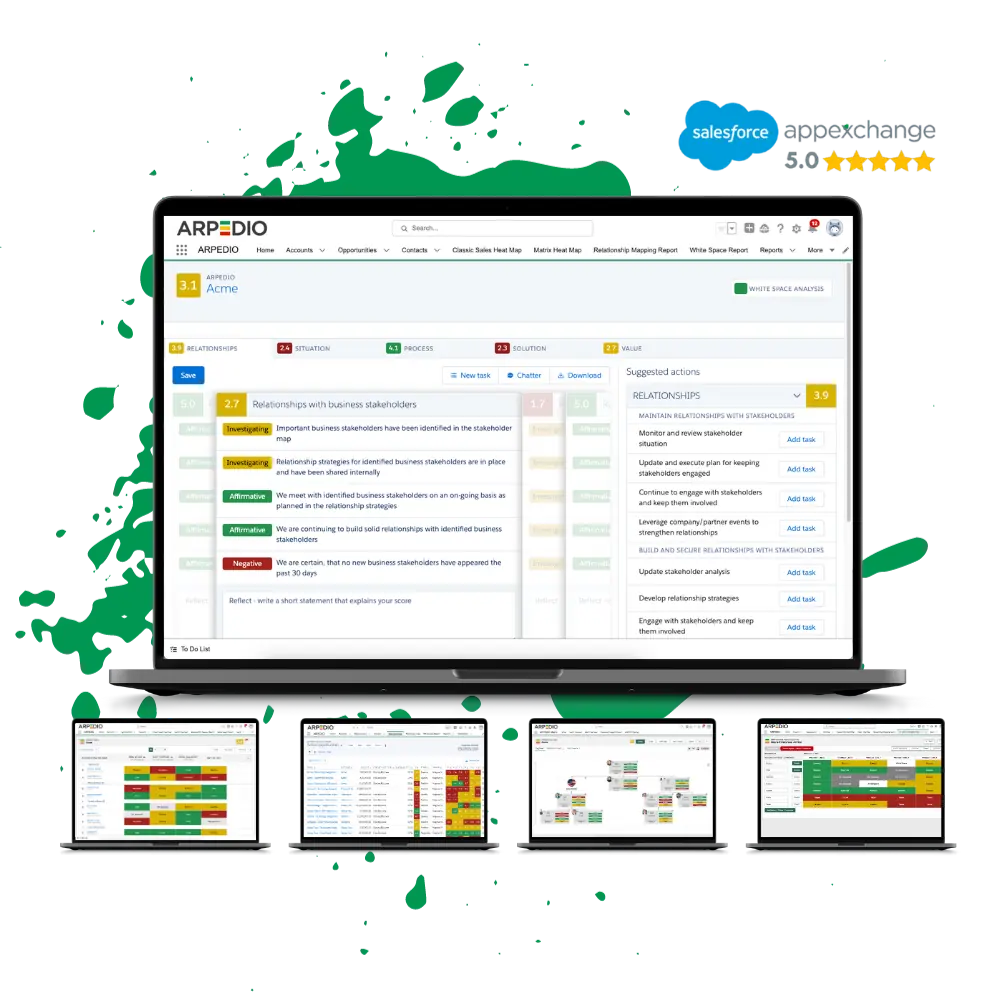For ARPEDIO’s first LinkedIn Live session, we had the pleasure of picking the brains of our very own sales experts, Ulrik Monberg, CEO and Founder, and Anders Pedersen, VP of Sales. In the following post, we explore what drove the founding of ARPEDIO, why Anders deployed ARPEDIO’s software during his time at Deloitte, and their thoughts on what the future holds for strategic account management.
Key takeaways
- Sales best practices – no one size fits all; customize your sales processes to fit your business and key accounts
- Collect and use your behavioral data to know what good looks like and outperform your competitors
Why ARPEDIO?
From his long career in Management Consulting, Ulrik Monberg has spent many years experiencing first hand how various CRM setups didn’t provide any value nor empower the individual, as well as sales processes not living up to their promise:
“It was always and solely about transactional data. That’s when we decided that the CRM space needed to be enriched with sales best practices and coaching tools [on top of Salesforce]. The vision is to empower business professionals in complex selling and strategic account management to enable companies’ sales best practices to come to life and generate behavioural data that you can correlate into improving your business even further.”
– Ulrik Monberg, Founder & CEO, ARPEDIO
Anders also has a background in consultancy and has spent more than 15 years in Big 4 working with complex solution selling and relationship management. Ulrik and Anders met when Anders worked as Partner and Director at Deloitte, and the two began their collaborative journey of implementing and embedding ARPEDIO’s tools at Deloitte – “with huge success”, Anders adds.
Sales best practices – no one size fits all
A countless number of different sales methodologies and sales training methods are available on the market today, and depending on who you ask, the answer to best sales best practices will vary. Oftentimes, salespeople tend to argue that there’s a single best way of selling. However, to repeat the same sales approach to every customer will often turn out to be a flawed strategy, if you ask Ulrik. He’s convinced that when it comes to sales best practices, no one size fits all.
Customization is key
Regardless of individual beliefs, Ulrik emphasizes that above all, what really matters is the company’s ability to customize its sales methods and processes to fit the company’s specific needs. Again and again, Ulrik has seen companies falling short, simply because their sales methods are too generic and not company-focused. And this is not a question of whether the sales methods available have good and useful components, because most of them do. But, at the end of the day, whatever sales method you choose to go with, it should first and foremost be method agnostic:
Companies that fail to focus their SAM efforts will struggle to determine what really works and what good looks like, Ulrik says, and continues to address that it is crucial to determine what really works for your company, instead of relying on a generic sales method – which is basically just a way of selling. Therefore, regardless of which sales and account planning methodologies you swear to, it won’t get a foothold in your company unless you manage to customize and adopt it – to ultimately shape your company’s sales best practices.
This is exactly what ARPEDIO can help you with, and also the main reason why Anders decided to employ ARPEDIO’s tools when he was still working at Deloitte. In the following, he will give his perspective on the impact it had.
How Deloitte’s search for structure sparked a strong collaboration with ARPEDIO
As Deloitte was launching a centralized sales department that needed to accommodate and collaborate across five different business units, as well as implementing an ambitious key account program across two different focus areas: Private and Industry, they needed a new way of working, both internally and with clients.
Ulrik recalls the first meeting between Deloitte and ARPEDIO: “In joining all the sales units and sales reps, Deloitte basically needed structure”. They were looking for a common way of working and thus ensuring that all sales reps and sales units were aligned, regardless of starting point and previous sales methods. In Denmark alone, Deloitte had more than 3500 employees, and the challenge was to define the sales best practices and implement it across all teams and departments. Anders emphasizes that the opportunity for a common way of working was undoubtedly the main reason for starting the collaboration with ARPEDIO and employing their tools:
Thus, Anders is convinced that it’s in your company’s best interest to create and implement a common language for working with clients and company sales best practices. The impact will be increased revenue, much better alignment both internally and externally, as well as ongoing development in competencies, because you will have coaching and training available at your fingertips.
Data over gut feeling
Data is another theme that occupies Ulrik and Anders, and for good reason. What traditionally drove sales was largely intuition and gut feeling. However, by now we should all agree that this is not particularly sustainable. Forward-thinking companies are instead turning to data and becoming more and more data-driven across all areas of business. In short, this means that your sales team collects and uses data as base for their strategic business decisions. This is a huge turning point for sales best practices, and also why Ulrik emphasizes data as key for better performance in any sales organisation:
Companies will claim they embrace data-driven sales management, solely based on the amount of data and reports available. However, it’s a completely different story to actually apply and leverage your data in your sales strategy. Many sales leaders and sales teams either won’t or don’t have the knowledge or resources to implement new data-driven sales strategies and processes. But, there’s no getting around it. Our world today is undeniably digital, and in this ever-changing digital landscape, companies must change too, if they haven’t already digitized their sales processes – which was only made more clear during and following the COVID-19 pandemic. Everyone who was able to work online did so, and this undeniably had a big impact on how we sell, work, and operate in general. And this is why you can’t afford not to leverage data in your sales strategy in today’s digital world. Fortunately, this is exactly what ARPEDIO caters to:
“Our mission is going in and helping collect some of the behavioral data on what really works in relationship management – who knows whom – as well as doing assessments of accounts over time. This is a process you have to start in order to get that data and enrich it, so you can do correlations with transactional data – which we have had for a long time in CRM and ERP systems – to actually go in and analyze, or have AI analyze, what is it that makes the winning deals come through, or the accounts churn, and how we actually avoid getting the bad cases versus getting more business and higher revenue. The companies that understand this, they’re winning. This might seem obvious, but I think that [collecting and using] data is the key, and then the way in there is how you operationalize the things that you really want people to do when you know what works, and that’s what we [ARPEDIO] are really all about.“
– Ulrik Monberg, CEO & Founder, ARPEDIO
A data-driven approach to sales includes working closely with your CRM. Combined with the right tools, a CMR is highly valuable in creating alignment and making data accessible throughout your sales department(s). Bottom line, to accelerate sales, sales reps must begin to rely on actual data, rather than gut feeling.
Sales processes must be fully integrated in day-to-day work, not as a theme at an annual sales conference
Anders agrees that data is very important in sales and also one of the main business drivers for the many prospects, clients and forward-thinking sales leaders he interacts with on a daily basis. Anders also emphasizes ‘transparency’ as another important driver: Transparency about how we work and what we’re working on. Most CRM systems are very transactional, and Anders experiences that many of the people he talks to are actually asking how they can support the sales reps and sales managers in the most professional and effective way, with ongoing and up-to-date coaching and sparring – instead of forcing employees off to annual sales conferences. Both Ulrik and Anders have attended their fair share of sales courses and conferences. But the problem with these is that it’s difficult to implement the learnings afterwards.
Sales tools are a necessity
Last but not least, Anders points out that sales departments are welcoming more and more sales tools to support their existing CRM systems. Just a few years back everyone would simply rely on their chosen CRM system, and in some cases maybe have one or very few tools to support the sales activities. Now it’s a completely different story, and Anders finds this development very interesting.
“When I speak with the most forward-thinking sales managers, sales leaders and chief commercial officers today, they are all referring to a sales tool stack of 8 to 10 different tools, growing into 12 to 15 tools, so I can see the interest is growing rapidly. Of course, the CRM system is the foundation, but the most forward-thinking organizations have also recognized that they need to put something on top of that, to create the data we speak so highly about.”
– Anders Gyldenløve Pedersen, VP of Sales, ARPEDIO
Ulrik ends the LinkedIn Live with a reminder to all of us: improving our sales processes, as well as our tools and employees is an ongoing process that never stops. It’s an agile process that will continue to evolve as you collect the data to know what to improve and how to move forward.
A big thanks to Ulrik and Anders for taking the time to share their thoughts on the future of strategic account management.
Watch or re-watch the LinkedIn Live here.

Ulrik Monberg, CEO & Founder
+45 31 46 31 56 / +1 818 946 6804
[email protected]
linkedin.com/in/monberg/
Follow us on LinkedIn to get all the newest perspectives and insights around strategic relationship management and sales innovation.

Ulrik Monberg, CEO & Founder
+45 31 46 31 56 / +1 818 946 6804
[email protected]
linkedin.com/in/monberg/
Follow us on LinkedIn to get all the newest perspectives and insights around strategic relationship management and sales innovation.
#1 Account-Based Selling Platform
Powerful alone. Superior together.
Boost win rates and reduce sales cycles. Enhance forecast accuracy.

